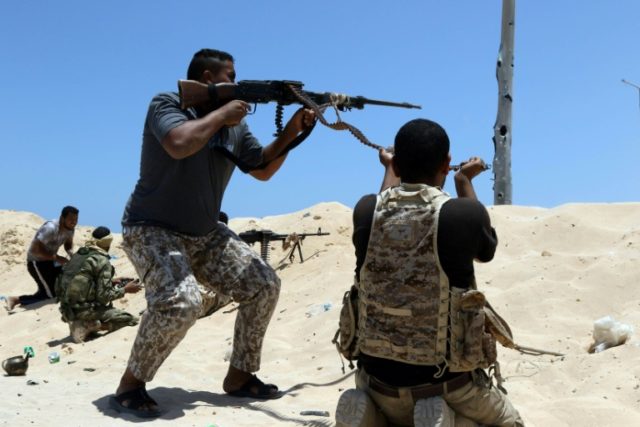A month of fighting between two of the many heavily-armed gangs fighting for control of Libya killed at least 115 people and wounded 383 more, according to a statement from the Libyan Health Ministry on Sunday.
Thousands of families have been displaced, children are at risk, and the conflict threatens to spiral even further out of control.
Reuters describes the battlefield and combatants:
The fighting pitted the Seventh Brigade, or Kaniyat, from Tarhouna, a town 65 km (45 miles) southeast of Tripoli, against the Tripoli Revolutionaries’ Brigades (TRB) and the Nawasi, two of the capital’s largest armed groups.
Tripoli and western Libya are run by a U.N.-backed government mainly supported by armed groups, while Eastern Libya is controlled by a rival administration. The country has been riven since Muammar Gaddafi was toppled in 2011.
The Kaniyat and other groups from outside Tripoli launched an assault on the capital in late August amid unease over reports of the wealth, power and extravagant lifestyles of some Tripoli militia commanders.
Both of these warring factions claim to have been authorized as militia by the Government of National Accord (GNA) in Tripoli – which is, in turn, only one of the governments claiming dominion over wide swaths of the country. There were high hopes for peace when international support solidified behind the GNA and it was blessed by the United Nations, but its own allies are busy shelling villages, killing civilians, and displacing people from their homes.
The situation could be about to get even worse, as the Libyan Health Ministry expects many of the wounded to die from their injuries, and another militia group has signaled it is prepared to join the fight on the side of the Tarhouna brigade.
The U.N. children’s fund UNICEF said on Monday that half a million children are in “immediate danger” from the fighting near Tripoli and over 25,000 people have been displaced. UNICEF reports over 1,200 families have been displaced in just the past 48 hours. The refugees are facing dire shortages of food, water, power, and medicine.
According to the United Nations agency, fighters have recruited children to serve as militia soldiers and at least one child soldier has died in battle.
The Government of National Accord on Sunday asked the U.N. to take “concrete and effective” action to “protect the lives and property of civilians” from the factional warfare.
U.N. Secretary-General Antonio Guterres expressed alarm over the “increasing number of violations of the ceasefire agreement” implemented on September 4. He said Libyan forces which violate “international humanitarian law and international human rights law” must be held responsible for their actions.
There is a great deal of money on the table for whichever faction ends up in control of Libya. Bloomberg News noted on Sunday that despite the appalling security situation and militia warfare, Libya’s oil output has reached its highest level since 2013 and has the potential to go even higher if order can be restored. The Islamic State is still very active in Libya and seeking to take control of the oil fields.

COMMENTS
Please let us know if you're having issues with commenting.